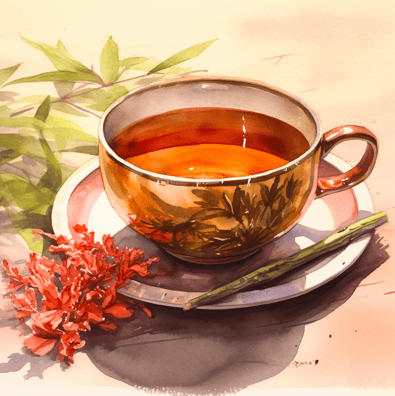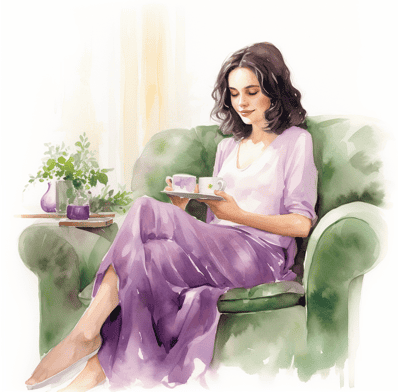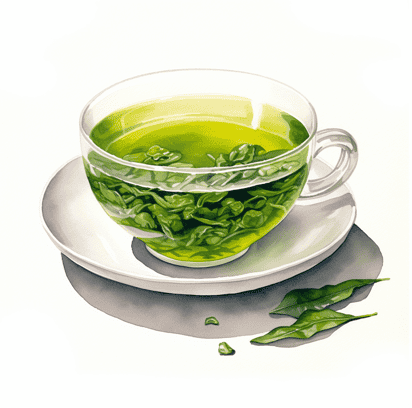
Digging through your tea cabinet, you stumble upon some tea bags that are way past their prime. Can you drink expired tea? Let’s clear up any doubts about whether those aged leaves can still be a part of your beauty ritual.
Hi, I’m Hazel
I gave up on skincare after years of issues with acne and sensitive skin.
But after going plant-based, my skin cleared up and even started to glow. Now I help women reveal their natural beauty with simple, delicious plant-based food.
I also used to be a nurse, and love nerding out on nutritional science (high-quality science, that is).

As usual, this post is based on the strongest nutritional evidence I could find with a focus on the simplest, most delicious foods
…because who has time to waste on anything less?
The quick version:
Expired tea, while not harmful if stored properly and showing no signs of spoilage, loses its flavor and health benefits over time. Proper storage in airtight containers, away from heat, light, and moisture, can extend the shelf life of tea, preserving its quality and nutritional value.
What Happens When Tea Expires?
Tea doesn’t spoil like food, but it does lose its charm.
Over time, even the best tea fades in flavour and nutritional value, which can affect its health benefits—something you definitely want from your cup of tea.

Flavour Fades
As tea ages, especially your favourite black tea or delicate green tea leaves, the essential oils that give it its unique taste dissipate.
This results in a less aromatic and flavourful brew, reducing the taste of freshness of your tea.
At first, the health-boosting antioxidants in tea stay pretty stable for about 90 to 120 days—meaning your tea keeps most of its benefits for up to four months. After that, the antioxidant levels start to drop off faster. By six months, there’s a significant decrease, and after about 11 months, the tea retains only about 25% to 40% of its original health benefits.
Nutrients Decline
Not just the taste, but the health benefits of tea—like antioxidants crucial for skin health—diminish as the tea gets older.
In rare cases, old tea can develop harmful compounds under poor storage conditions, posing potential health risks.
You may also like:
How to Glow Up With Jasmine Green Tea Skin Secrets
So Brew with Caution
It’s important to err on the side of caution when deciding to brew your favourite tea that’s past its prime.
Understanding the changes that happen to tea after its expiry date helps you make informed decisions about what to brew. This ensures you’re not just sipping for comfort but also for health and beauty benefits…
Is It Safe to Brew a Cup?

Even if your tea has reached or passed its expiry date, it’s usually safe to drink as long as there are no visible signs of spoilage like a musty smell or foul oder.
However, the quality of the tea can significantly influence whether you should still brew it.
Check for Spoilage
Inspect your tea bags or loose tea for a found oder or discolouration. These are clear indicators that your tea might not only taste bad but could also be harmful.
While most expired tea leaves are safe, the loss in flavour and health benefits means you won’t get the full beauty-enhancing effects you’re looking for in your tea routine. That is, while the tea itself might not be spoilt, your benefits may be.
Quality Over Time: What You Need to Know
The longevity and enjoyment of your tea depend heavily on how it’s stored. Proper storage can maintain both flavour and nutritional value, extending the shelf life of tea.
Storage Tips
Keep your tea in an airtight container and place it in a dark, dry place, away from direct sunlight.
This protects the tea from its main enemies: air, moisture, and light, ensuring it stays fresh for a long time.
Tea Types and Their Lifespan
Different types of tea have varying lifespans.
Herbal tea and oolong tea may have a shorter shelf life compared to black tea.
For loose-leaf tea, which often retains its quality longer than pre-packaged tea bags, proper storage is also crucial.
Tailored Storage Solutions
Knowing the specific tea expiration dates and characteristics of each type of tea helps tea lovers tailor their storage solutions to maximise longevity.
This ensures that every cup of tea you store tea remains as beneficial and delightful as possible, even after an extended period.

Key Strategies for Loose-Leaf Tea
Storing loose-leaf tea correctly is vital due to its sensitivity to environmental factors. Here’s how to tailor storage to maintain its optimal quality:
- Airtight and Opaque Containers: Choose containers that completely block light and seal tightly to prevent air exposure. Ceramic or tinted glass containers with airtight lids are ideal.
- Consistent Temperature: Store your loose-leaf tea in a place with a stable, cool temperature. Fluctuations can accelerate the degradation process, affecting the tea’s delicate flavours.
- Moisture Control: Ensure the storage area is dry. Any dampness can ruin loose-leaf tea by promoting mould growth or causing it to clump together.
Adjusting for Tea Types
- Green and White Teas: These delicate teas are very susceptible to heat, light, and moisture. Besides using airtight containers, consider storing them in the refrigerator if not used frequently.
- Black and Oolong Teas: These have a sturdier structure and longer shelf life. They benefit from being stored in a cool, dark cabinet but generally do not require refrigeration.
- Herbal Teas: Herbal blends might contain fruits or flowers that are prone to quicker spoilage. These should be kept in very airtight conditions and checked regularly for any signs of deterioration.
Special Considerations
- Frequency of Use: If you access your tea daily, use a smaller container that you can refill from a larger, main storage tin to minimise air exposure to the bulk of your supply.
- Label and Date: Mark containers with the type of tea and the date of storage. This helps in tracking how long the tea has been stored and managing the rotation to use older teas first.
Making the Most of Old Tea
If your tea is past its peak but still seems fine, think beyond just drinking it.
There are clever ways to repurpose old tea leaves that may not be ideal for a cup of tea but can still be useful around your home.
Creative Uses in Home and Garden
Sprinkle used tea bags around your plants to enrich the soil or use them in your drawers as natural fresheners. This not only recycles the tea but also leverages its remaining properties in eco-friendly ways.
Beauty Hacks with Tea
Old tea bags can be chilled and used as soothing eye compresses to reduce puffiness. This reuses your expired tea bagsin a way that enhances your skincare routine, aligning with your beauty goals.
Can you drink expired tea?
While expired tea might not make the best brew for taste or health, it doesn’t have to go to waste. Understanding how to check for its safety and finding alternative uses can extend the value of your tea collection.
References
Most references below will link to the original peer-reviewed study itself. However, sometimes I will link to a video over at NutritionFacts.org instead, which is by far the single best resource of brutally transparent nutritional evidence you will ever see. Dr Greger tells a great story about the realities of the science and if I think you will benefit more from one of his videos, the link will take you there instead.
Happy nerding!